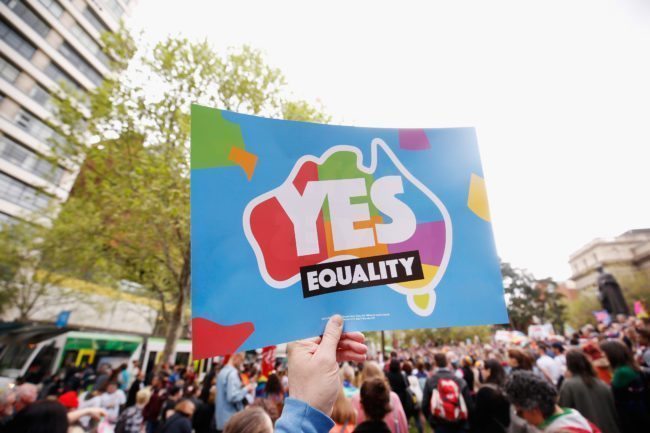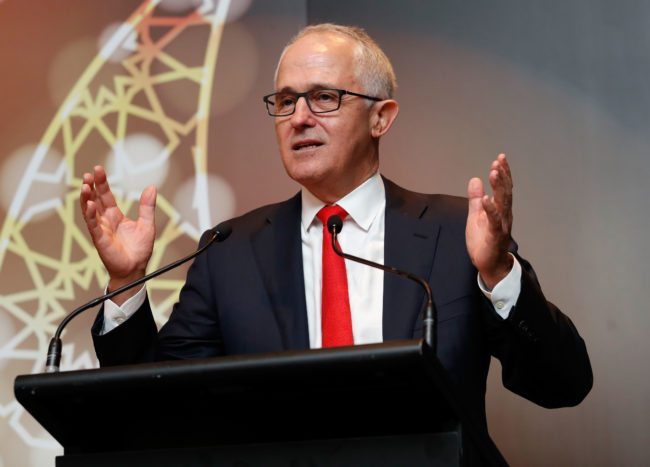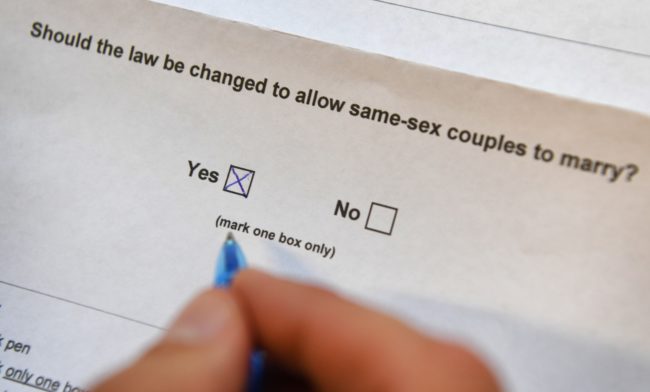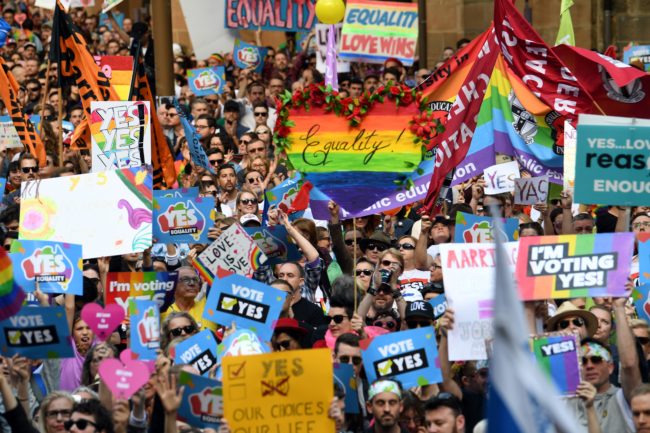Emotions run high as same-sex marriage bill introduced in Australia

A day after the Australian public voted Yes for same-sex marriage, a bill has been introduced into the country’s Parliament to legislate for the change.
It was announced on Wednesday that Australia had voted Yes in a historic nationwide survey on same-sex marriage.
Almost 13 million Australians (79.5%) voted in the country’s non-binding postal ballot – a bigger turnout than in even the UK’s EU referendum.

(Getty Images)
The historic vote follows in the footsteps of Ireland by endorsing same-sex marriage in a national vote.
Australia now looks likely to become the 25th country in the world to introduce marriage for same-sex couples.
Emotions ran high as the bill was introduced by out gay Senator Dean Smith, which seeks to legalise same-sex marriage.
As he introduced the bill in the Senate, Smith said: “Yesterday, we saw a glimpse of the country we all yearn for, a country that is fair-minded, generous and accepting. We saw a country that was willing to embrace its hopes rather than hold on to its fears.
“Many of us across this chamber have seen something of that great Australian story that compelled us into public life. For the Liberals and Conservatives who yearn for change, we see in this result the shining city on a hill with more freedom, more acceptance and more grace.”
Of speculation that some may seek to derail or delay the bill through the amendment process, Senator Smitha added: “Let me be clear: Amendments that seek to address other issues or which seek to deny gay and lesbian Australians with the full rights, responsibilities and privileges that they already have will be strenuously opposed.”
Yes responses represented 61.6 percent of responses with 38.4 percent voting No.
The Government has since vowed to push forward to legislate same-sex marriage by Christmas, and Opposition leader Bill Shorten has also said the same.
Celebrations took place from early Wednesday morning as Yes campaign headquarters across Australia opened their doors ahead of the result.

The No campaign conceded defeat, having previously said it would settle for a result over 40 percent, with Tony Abbott, former Prime Minister, claiming that would be a “moral” victory.

The public vote is not legally binding, so both houses still need to pass legislation for it to become legal.
Monday is the first day that a same-sex marriage bill can be tabled in the House of Representatives, which is not sitting this week.
But many representatives took visitor seats in the Senate as Senator Smith’s bill was introduced.
A bill must pass in both houses before it can be signed into law by the Governor-General.
Hardline anti-LGBT MPs within the governing Liberal-National Coalition say they will not be conceding – even if the public gives a strong backing for equality.
Two bills will be proposed to parliament – Senator Smith’s bill, backed by a coalition of same-sex marriage supporters proposing simply to introduce the other measure, and another by a right-wing Senator proposing same-sex marriage, but with various “religious freedoms”.

Liberal James Paterson is to introduce the caveated bill that would override any anti-discrimination laws passed by state and territory level legislatures.

Protests in Australia (SAEED KHAN/AFP/Getty Images)
It will permit anyone who holds a religious or “conscientious belief” in traditional marriage to refuse same-sex weddings, allowing discrimination by private service providers.
The proposal comes after a bombshell poll found half of Australians support service providers being allowed to refuse same-sex weddings on the basis of private religious views.
Hardliners may also table a string of amendments if their desired bill doesn’t go through, in a bid to seriously change or slow the introduction.
However it seems unlikely same-sex marriage will not be introduced in some form, with the opposition Labor Party supporting the measure, and a majority of parliamentarians in favour.

